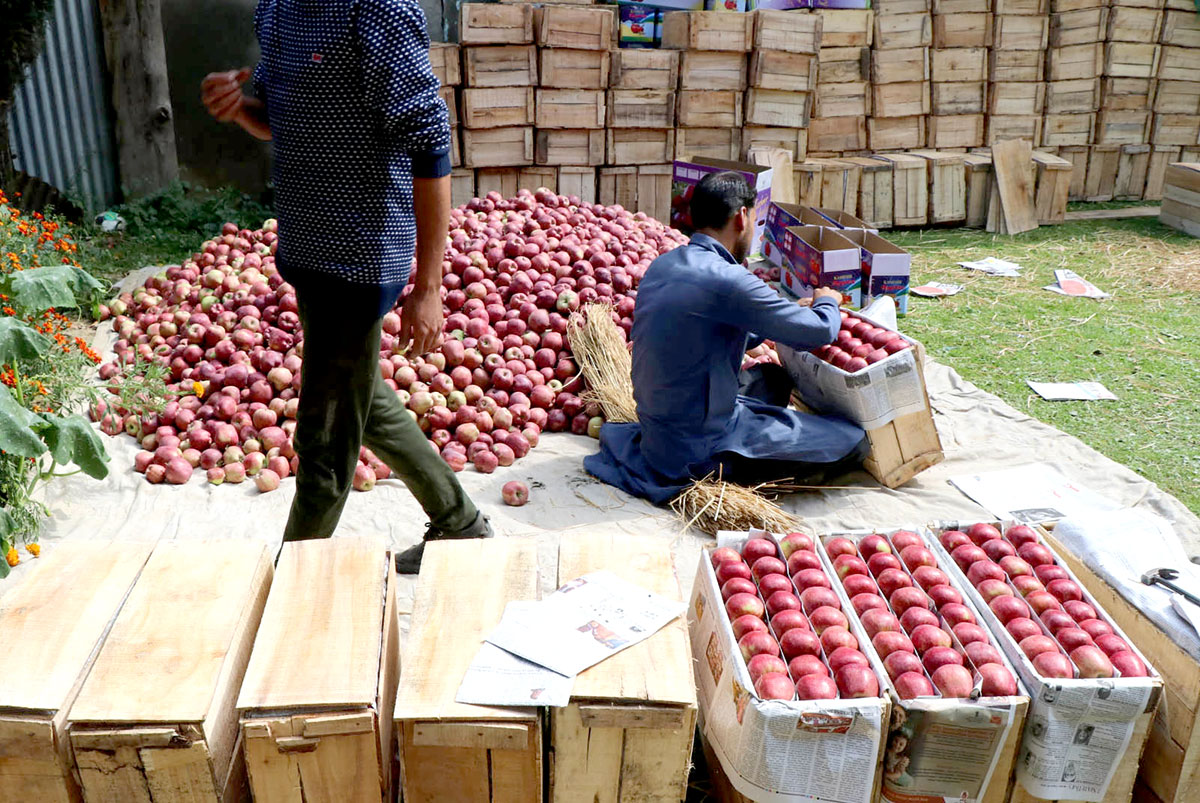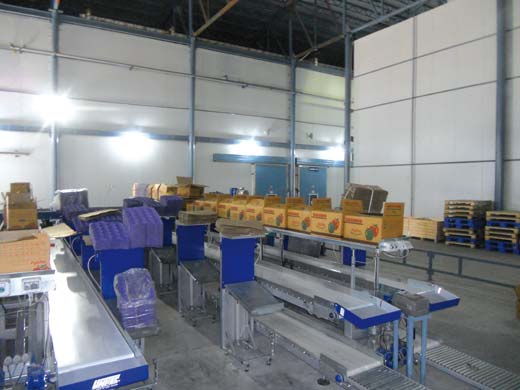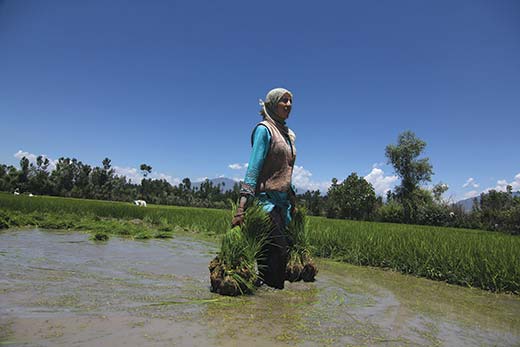by Syed Suhail Yaqoob
The problems are about to multiply for growers. The statistical data is clear about it. There has been an increase in the marginal land holdings over time as well as the dip in agricultural landholdings.

There are reports emerging from media sources that the apple industry has witnessed a severe downslide in prices. The culprits are tax-free imports from Iran and Dubai. The prices have declined from around Rs 1200 rupees to around Rs 600 per bucket outside the state.
Unfortunately for growers, the imports have increased in previous months which is mostly considered as ‘selling season’ especially for apple production kept in cold storage. According to the data available around 1.5 crore apple buckets are lying in cold storage facilities. Moreover, additional 1.5 crore apple buckets are available in ‘Godwons’ across Kashmir.
The latter belong to marginal growers. The concept of ‘cold storage’ facilities in Kashmir was a novel concept. It was meant to stabilize the prices in the peak of the harvesting season. The growers would have received fair prices after harvesting. Moreover, the establishment of ‘Mandi’s’ across Kashmir also helped growers to establish direct contact with the end buyers. This eliminated enough exploitation carried out by the intermediaries.
The Cold Store Chain
The establishment of cold storage facilities and Mandi’s did benefit growers in Kashmir. Over the last few years, however, the apple industry has been affected by a lot of problems.
The first and the core is environmental degradation. Kashmir division has witnessed a severe crisis in its history due to untimely rainfall and snowfalls. In 2018, the untimely snowfall caused havoc throughout Kashmir. The apple industry witnessed losses of Rs 500 crore. The untimely snowfall broke branches of apple trees and 35-45 per cent of apple harvesting was yet to be carried out. Some heart-wrenching videos of destruction circulated on social media.

Moreover many thousands of trucks were stranded on the Kashmir-Jammu roads, which further had consequences on the apple industry. It is imperative to note here that after witnessing almost full-scale destruction caused by untimely rainfall, hailstorms or snow, there is yet to have some improvised ways devised to minimise the damage.
Early Prunning
The farmers have, however, relied on early pruning right after the harvesting to minimise the damage from early snow. This obviously is not healthy for the apple trees. Pruning in early fall may stimulate new growth which has little time to harden before cold weather sets in. The cold can harm this tender growth and the tree may need more pruning in spring to remove the damage.
Moreover, the early pruning will leave the apple tree weaker since it tries to accumulate energy in the roots. Some farmers have, however, tried a novel concept of summer pruning. This is a way to minimise the damage from early snow. It has many more advantages as well. There is, however, a need for extension services about summer pruning.
Many growers have difficulty in finding the right people who are specialised in summer pruning.
Weather Issues
The untimely rainfall or snow that damages crops has a significant impact on the livelihoods of farmers. Significant damage to the crops surely will reduce farmer income. Most of the farmers have no knowledge about the crop Insurance schemes run by the government.
The farmers must be provided knowledge about these schemes to recover losses as well as to stabilize the income.
Crucially, according to the government of India report, the compound annual growth rate (CAGR) of real income between 2002-03 and 2015-16 of the agri-households in Jammu and Kashmir is minus 2.3 which are not only lowest but also the only state with minus CAGR. The dwindling income of the farmers, experts believe, is the failure of the state government to draft an agriculture policy.
No wonder there was an increase in the percentage of debt among farmers in Jammu and Kashmir. According to a report the state witnessed an increase of 149 per cent outstanding farmer loans.
Multiplication of Problems
The problems are about to multiply for growers. The statistical data is clear about it. There has been an increase in the marginal land holdings over time as well as the dip in agricultural landholdings.
Statistical evidence reveals that around 94 per cent of the landholdings are marginal. Further, there has been a dip in agriculture landholding from 0.62 hectares to 0.59 hectares per person and the conversion of an estimated 78 thousand hectares of farmland for non-agricultural purposes in Kashmir from 2015 to 2019 should act as an eye-opener to the government and policymakers.

This conversion might assume a fast pace with the new policies in place. In recent times, there is a serious concern about the new notified laws. The administration can provide a nod to the conversion of agricultural land to non-agricultural uses, albeit there are certain but fewer conditions attached to it.
These notified laws have to be essentially seen in line with the abolition of Articles 370 and 34A. The laws notified delegates the power to District Collectors to provide a nod to the conversion of agriculture land for non-agricultural purposes, however, there are some conditions attached to it. It is evident that Kashmir will see the rapid pace of land holdings over time.
Lack of Diversification
There is another issue that crept into the apple industry, is the lack of diversification. In major apple belts, almost similar types of apple products are produced. In Shopian, Kulgam and Anantnag areas, the major apple produce is of Kulo-Apples or Delicious apples, in the north area, there is some production of Ambri-Apples.
Moreover, the data reveals that apple production occupies a major area compared to other horticulture products. Around 90 per cent of the area is devoted to the production of apples in overall acres devoted to horticulture produce. Open an economics book and everyone will observe the benefits of diversification. This is a serious risk and speaks of the lack of policy at the highest level. This poses a severe risk to our livelihood as Kashmir concentrates only on particular produce.
A decline in prices will significantly increase poverty and result in loss of income. Around 70 per cent of our population is directly or indirectly associated with horticulture. No doubt apple production is a cash crop, but its utility over time has decreased owing to a number of varied reasons both political and economic.
There is a serious concern among the rural areas that a decline in prices of apple produce, as we are witnessed now, will destabilise the social fabric in Kashmir. The industry is not doing well for the past few years. This year the prices will be affected both by the Omicron fears as well as the imports from Iran and Dubai.
High Density
The hope today rests on the high-density apple cultivation. After suffering a recent decline in apple production owing to unseasonal, heavy snowfall, poor pricing and lockdowns high density apple cultivation has restored some hopes. As of today, the high-density cultivation is spread to an area around 5000 kanal of horticulture land is under cultivation of high-density varieties.
Compared to traditional apple cultivation, these plants are more resistant to pest and fungi, take less space and produces fruit after a span of 2-3 years. For traditional apple trees, it takes around 15 years to produce the fruit. The high-density apple production can do away with the decline in the average landholdings. A kanal of land can absorb as many as 500 high apple density trees as against only 20 in traditional trees.
Further, the high-density produce gives the prices which are double the traditional produce. However, in these years, unexpectedly, there was a sharp decline in the prices of high-density apples as well. Many blamed this on early harvesting and wrong plantation. The high-density plantation can do away with a lot of problems associated with traditional apple production. There is however a need for more efforts to have a planned high-density apple production.
Resorting to high-density cultivation is the first step in the whole process. There has to be a sufficient infrastructure for the post-harvesting of apple produce. Jammu and Kashmir is losing 30 per cent of its produce due to poor post-harvest infrastructure.
Losses
In absence of adequate post-harvest infrastructure substantial amount of wastage is experienced in horticultural produce especially regarding fresh fruit which is perishable in nature. Experts say that there are losses to the extent of 10 per cent at the field level, 5 per cent at the transportation level, 2 per cent at the packaging level, 9 per cent at storage and 4 per cent at the processing level.
The data reveals the clear mishandling of one important sector of our economy. In addition, the storage facilities are not enough to keep in line with the production which forces the farmers to sell the produce at lower prices.
Although there are problems associated with the apple industry these days, a clear draft policy needs to be set in place to handle the horticulture sector properly of which apple production is dominant. Jammu and Kashmir produces 75 per cent of apple production in India and that too of different varieties.
Knowledge Required
The state is known for its fresh produce both in India and outside India. The first and foremost is the large scale extension services to be provided to farmers. Knowledge is essential in producing high-quality produce. The horticulture department needs to revamp its efforts to provide maximum knowledge to farmers with regard to spraying, pruning and handling of apple production.
Unfortunately, farmers still rely on traditional know-how in rural areas. There is a serious gap between the horticulture department and the farmer at the field level. Second, there has to be an increase in storage facilities and also attempts to increase high-density apple cultivation under the careful watch of the government. An unplanned expansion is highly disastrous for our economy. Third, there is a need to have some type of cooperatives in the apple sector as well. A cooperative among peasants will have more bargaining power to decide upon the rates of the produce.

Unfortunately, our apple sector has become highly divisible over time. It provides an undue advantage to the buyers at the time of harvest. If cooperatives are not available, in meantime, the government must ponder over the minimum support prices in the case of apple produce as well. These MSPs have to increase in tandem with the general price level.
Over the years the increase in the price of apple produce has failed to keep pace with the increase in prices of inputs. Further all-weather roads have to be opened to prevent wastage of apple produce. An immediate concern is to tax the imports of the Iranian and Dubai imports. There are, however, few prospects that the government of India will tax the imports. Lastly, the diversification to other cash crops is essential to protect our livelihoods over time. A cue from Himachal Pradesh could be taken by both farmers and policymakers to diversify our horticulture economy.
(The author is PhD in economics from Aligarh Muslim University. The opinions expressed in this write-up are those of the author’s and do not purport to reflect the views of Kashmir Life.)















